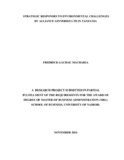| dc.description.abstract | Organizations are faced with a myriad of challenges emanating from the environment. In
order to survive, strategies have to be devised to respond to the forces that threaten to halt
survival. Companies that do not respond appropriately are usually driven out of business.
Companies respond to the challenges in terms of devising cost cutting strategies, adopting
new technologies, competing on low prices or on high quality products or services,
differentiating the products or focus strategies. The cotton industry in Tanzania has had a
number of environmental changes over the years. The challenges are compounded by the fact
that most of their customers are international customers who hold enormous powers making
them the major determinants in the pricing of the industry’s final products. Most companies
within the industry have had to devise ways of responding to these changes in order to
survive. Alliance Ginneries ltd has been a player in the industry for many years and is
expected to have formulated strategies to enable it respond to these changes. This research
was carried out to examine how Alliance Ginneries Company in Tanzania is strategically
responding to challenges posed by the competitive environment. The research was a case
study of Alliance Ginneries ltd, a Tanzanian company with subsidiaries in Zambia and
Zimbabwe. The researcher used an interview guide as the primary data collection instrument.
The interview guide was administered using e-mails and face to face interviews through
video conferencing to the departmental heads and other employees in management positions
at Alliance Ginneries. Data collected was analyzed based on content analysis. The study
found out that the operating environment in the cotton industry is very dynamic and volatile.
The study further concludes that Alliance Ginneries had adopted various strategies to respond
to the environmental changes such as expansion into new regions, operation cost reduction,
restructuring and outsourcing of non-core activities. The study recommends that Alliance
Ginneries should engage in more cost reduction as a response to its competitor’s strategies.
The government should also reduce some of the regulatory measures to give the industry the
power to regulate itself since the industry is heavily regulated. Further research should be
undertaken to establish the strategic responses to competitive changes employed by other
companies within the cotton industry. The study was limited in that it included respondents
from one company and conclusions drawn may not be representative of the whole industry. It
also captured members of one focus group excluding other important stakeholders from the
study | en_US |

